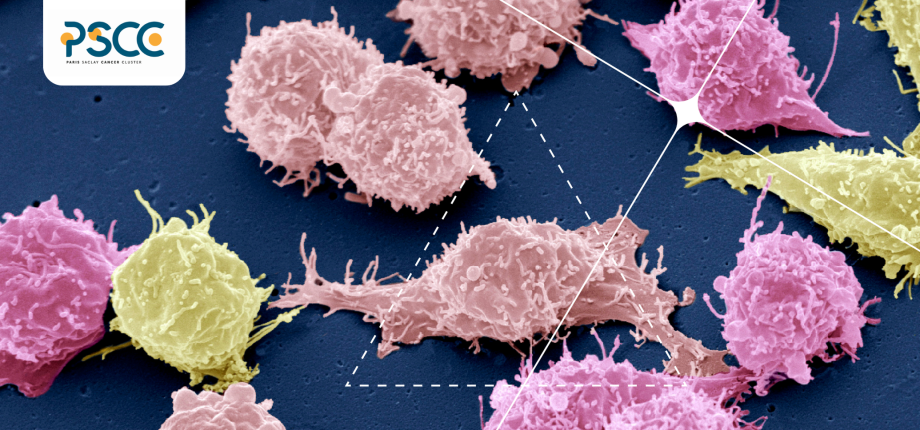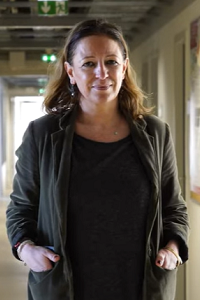Paris-Saclay Cancer Cluster and Institut Polytechnique de Paris: innovation in battle against cancer

It is now accepted that one woman in six and one man in five will develop cancer in their lifetime. Even though advances in research and medicine are steadily increasing the chances of 5-year survival (30% in 1970, 50% in 2000, 80% in 2030), the disease remains the second leading cause of death worldwide (number one in developed countries), and the number of cases is rising as a result of aging and population growth (+2% in 2040)*.
A cutting-edge ecosystem to support innovators
Since February 2022, the Paris-Saclay Cancer Cluster (PSCC), of which the Institut Polytechnique de Paris (IP Paris) is a founding member along with the Université Paris-Saclay (UPSaclay), Inserm, Gustave Roussy and Sanofi, has been organizing itself in response to this phenomenon. With funding of €100m over ten years as part of the France 2030 program, it is building a high-performance ecosystem to support players in oncology innovation. The PSCC acts as a catalyst to transform potentially revolutionary approaches into industrial diagnostic and therapeutic solutions for the fight against cancer. The aim is to make screening and treatment more predictive, precise and effective, for the benefit of patients.
“Startups and the scientific community in laboratories and hospitals are our core audience,” stresses Elsa Angelini, a professor at Télécom Paris, a specialist in medical image computing and Deep Learning, and IP Paris' academic correspondent for the Paris-Saclay Cancer Cluster. “We offer them a catalog of cutting-edge services to support their maturation projects. IP Paris' engineering schools, for example, provide solid expertise in data science, statistical learning and mathematics, as well as in biology and cutting-edge microscopic imaging. Innovators have access to a pool of experts, the know-how of numerous laboratories and high-level experimental infrastructures”, adds the researcher. Structures such as the Laboratoire d'Optique et Biosciences (LOB**) of the École Polytechnique, whose imaging expertise is unrivalled anywhere else, will, for example, be able to shed light on projects focusing on the study of tissues. On the IP Paris side, a start-up from the Institute will be able to seek advice from a doctor specializing in certain types of cancer, and test the relevance of its technology.
The PSCC also funds large-scale technological platforms installed in its partner hospitals. Analysis, sequencing, screening... these particularly costly infrastructures are accessible to projects supported by the PSCC and, more broadly, to France's innovation ecosystem. Five platforms have already been validated: single-cell analysis and transcriptomics, cell therapy, immunotherapy, explanted organs and early clinical trials. The topics are numerous, and initial work began in 2024. The PSCC will be able to identify other platforms at a later date and work to make their launch possible. They will then have two years to become financially independent.
A project for an inter-hospital platform dedicated to health data in oncology
One of these infrastructures will be dedicated to data. This is one of the major challenges facing the cluster, which aims to facilitate its ecosystem's access to real-life data, including the associated biological samples held in healthcare establishments. Data that can be consulted from multiple locations will be anonymized, cleansed, structured and interoperable. “This huge project involves structuring and combining information from images, patient records and biological analyses from French (and later European) hospitals specializing in the fight against cancer, using a common data model. This requires a great deal of work on the selection of clinical variables, the structure of the cleaned data and the integration technique via a portal enabling several establishments to be queried at the same time. A key milestone was reached in 2024 with the signing of agreements with the first three hospitals on the platform,” explains Elsa Angelini.
In terms of diagnostics, access to such data will be an asset, for example, in training an algorithm to interpret an imaging examination (CT scan, MRI, etc.) on very large cohorts covering the wide variety of equipment used in clinical routine. This will also provide essential information on different patient profiles for the development of new drug molecules. “Pharmaceutical groups are currently spending millions of dollars in the United States to buy this structured data, because it doesn't exist in France. This is nonsense, because it concerns American populations whose environment and lifestyle are different from French and/or European populations. And yet, taking these parameters into account is essential to understanding cancer and fighting it. There are therefore not only economic, clinical and scientific issues at stake, but also societal ones, in building the platform”, emphasizes the researcher.
Training tailored to innovation project leaders
The Paris-Saclay Cancer Cluster also uses training to support innovation. “At this stage, we are not offering degrees to PSCC innovators. However, we do supplement their knowledge via a catalog of IP Paris training courses open to them. In conjunction with the Université Paris-Saclay, we are also looking into models for dedicated courses in biotechnology, biomedical engineering, data science and innovation, with different levels of modules adapted to the constraints of innovative project leaders”.
The PSCC ecosystem is designed to be comprehensive, with selective entry to encourage early-stage, scientifically creative projects with very high therapeutic or diagnostic potential. In addition, the PSCC Connect association enables all economic players wishing to become involved in the fight against cancer to join the cluster's ecosystem, without selection. “PSCC Connect creates new collaborative opportunities for its members. It also offers them a unique insight into the development of innovations, and can open the door to personalized support,” concludes Elsa Angelini.
*Source PSCC

About :
Elsa Angelini received a B.Sc. degree in 1996 from the Ecole Centrale de Nantes (Nantes, France). She joined the Biomedical Engineering Department of Columbia University in 1997, and received a M.Sc. degree in 1998. She received a PhD in Biomedical Engineering at Columbia University in 2003. She stayed at Columbia University as a post doctoral fellow until March 2004. She then joined the Department of Image and Signal Processing, at Télécom Paris where she is an associate professor with specific focus on image processing for biomedical imaging applications (currently on leave, but double affiliation remains). In 2010, she spent a 5 months sabbatical as a Visiting Scientist in the Biomedical Imaging Group of the CSIRO-Australian e-Health Research Center, Brisbane, Australia. She passed her Habilitation à Diriger des Recherches (HDR) in 2011. She has been, since 2012, affiliated with Columbia University, as an Associate Research Scientist and co-director of the Heffner Biomedical Imaging Laboratory. She is also affiliated with Imperial College London since 2016, within the ITMAT Data Science Group (NIHR Imperial Biomedical Research Centre) as a Senior Research Data Scientist. She is since 2023 Professor at Telecom Paris, in the IDS Department. She has co-authored over 150 peer-reviewed publications. She co-leads the BioImaging track of the BME-Paris Master Program.
Her research interests include:
- Machine learning for medical and biological imaging applications.
- Clinical applications related to multi-dimensional imaging modalities for denoising, enhancement and segmentation.
- Image and signal processing, sparse decompositions, computer vision, computer graphics and scientific visualization.
- Enhancement of image quality for different clinical modalities and diagnostic applications.
- Quantification and phenotyping of anatomical structures and physiological functions with clinical associations.
- Anatomical modeling.
**LOB: a joint research unit CNRS, Inserm, École Polytechnique, Institut Polytechnique de Paris, 91120 Palaiseau, France
Contacts at the Institut Polytechnique de Paris :
>> Elsa Angelini, Institut Polytechnique de Paris academic correspondent for PSCC and member of the Steering Committee of the interdisciplinary Engineering for Health Center (E4H), Professor at Télécom Paris.
>> Silvia Corsini, Director of Operations, E4H Interdisciplinary Center.













